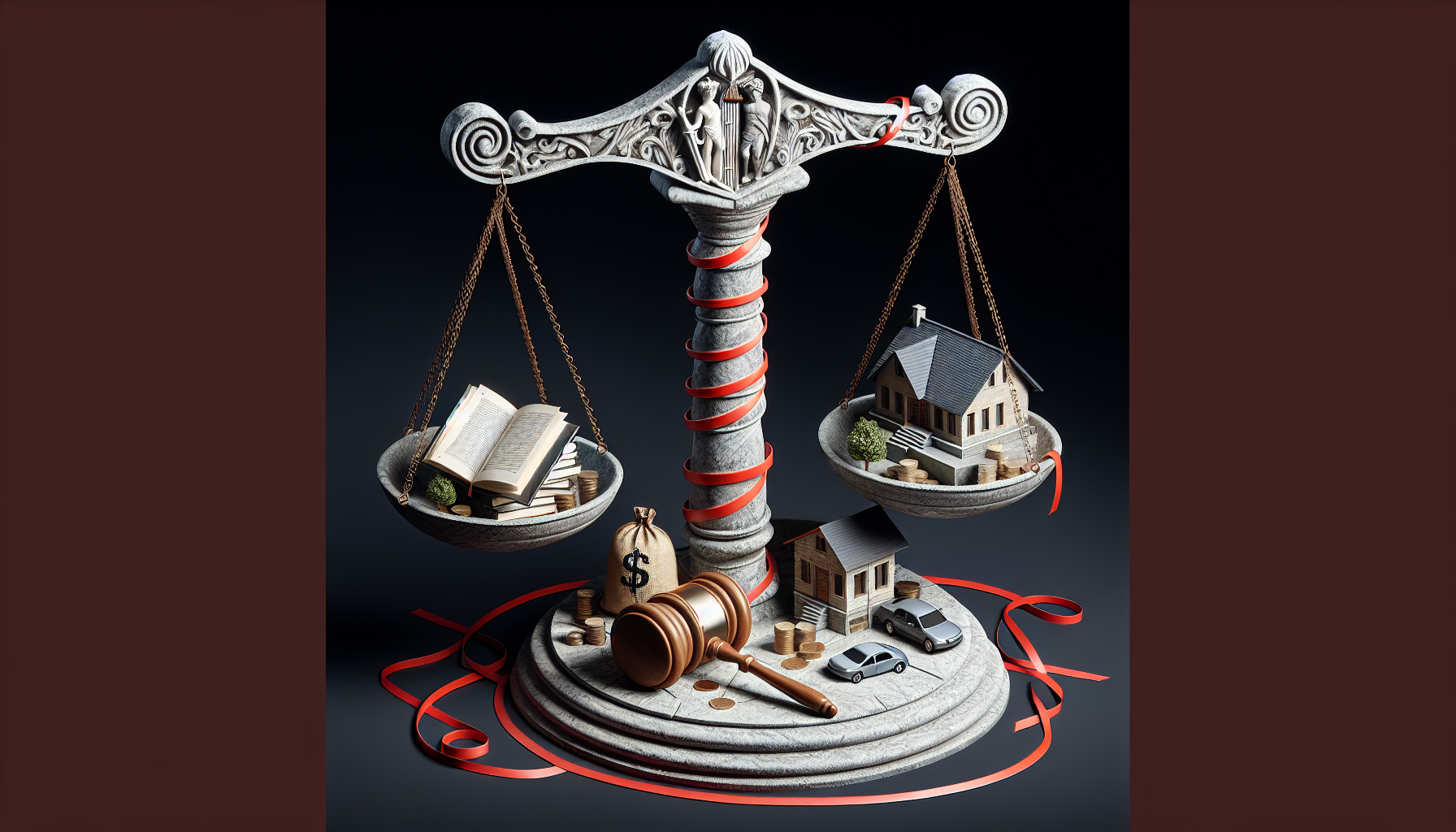Civil forfeiture allows the government to seize assets suspected of criminal ties, with or without charging the property owner. This guide explains the contentious process of property forfeiture, addresses legal controversies, and arms you with knowledge to navigate potential impacts on your property rights.
Key Takeaways
- Civil asset forfeiture is a legal tool allowing law enforcement to seize property suspected of involvement in a crime without a criminal conviction, raising concerns about property rights and due process.
- Federal and state laws governing civil forfeiture differ, with various states recently reforming their laws to increase the burden of proof on the government or eliminate civil forfeiture without a criminal conviction.
- Critics and reform advocates argue that civil forfeiture may violate constitutional rights, incentivize policing for profit, and disproportionately impact minorities, prompting judicial and legislative actions for reform.
Civil Forfeiture Explained

Have you ever imagined a court case where a house or car is the defendant? Welcome to civil asset forfeiture! This mechanism allows law enforcement to seize and potentially keep or sell property alleged to be involved in a crime, even without a criminal conviction. In civil forfeiture cases, the property itself is on trial, not an individual, in proceedings known as in rem, or against the property. This legal tool is designed to deprive criminals and criminal organizations of their ill-gotten gains through the seizure of assets.
While it might sound like a scene from a legal drama, it’s a reality for many property owners. From houses and cars to cash and jewelry, a wide array of personal property can be subject to civil forfeiture. The stakes are high in these cases, with both property rights and law enforcement efficacy hanging in the balance.
Law Enforcement Agencies’ Role
For law enforcement and government agencies, including the Drug Enforcement Administration, civil forfeiture is more than just a punitive measure. It is seen as a strategic tool to dismantle criminal enterprises by debilitating their financial foundations. This not only disrupts illegal activities but also generates revenue for law enforcement purposes. The power to confiscate property suspected of being tied to illegal activity is wielded by law enforcement agencies, regardless of the owner’s arrest or conviction status. In some cases, administrative forfeiture can be applied as a streamlined process for seizing assets without the need for a court trial.
However, these powers are not without their critics. The broad authority given to law enforcement officers has led to accusations of potential abuse. Critics argue that this practice can lead to the violation of due process rights and the erosion of the presumption of innocence until proven guilty.
Civil vs. Criminal Forfeiture
Grasping the distinction between civil and criminal forfeiture is fundamental in the discussion surrounding asset forfeiture in criminal and civil cases. Civil forfeiture functions autonomously from criminal charges, permitting the seizure of property in the absence of a conviction or charge against the property owner. Conversely, criminal forfeiture is integrated into the sentencing that follows a criminal conviction.
In civil forfeiture cases, the government generally faces a lower burden of proof than the ‘beyond a reasonable doubt’ standard required in criminal cases. Property owners often have the burden of demonstrating that their property is unrelated to someone convicted of a crime. This process provides law enforcement with a means to recover assets out of criminal reach, such as property owned by fugitives, terrorists, or deceased individuals, and allows for resolving property issues in a single court proceeding.
The Legal Framework of Civil Asset Forfeiture

Civil forfeiture laws in the United States have a long history, evolving from medieval ‘deodand’ theories and significantly expanding during the War on Drugs. Today, these laws extend their reach beyond drug-related crimes. The Civil Asset Forfeiture Reform Act of 2000 introduced procedural reforms to federal civil forfeiture law, addressing some of the concerns raised over the years.
Nonetheless, certain facets of civil forfeiture laws have garnered attention. The facilitation doctrine in federal law, for example, allows for the seizure of property that has ‘facilitated’ a crime. This doctrine, while instrumental in law enforcement’s fight against organized crime, has faced criticism for its potential for abuse.
Federal Law
On a federal scale, the Comprehensive Forfeiture Act of 1984 significantly contributed to the initiation of aggressive asset forfeiture. It permitted the federal government to confiscate property suspected of involvement in illegal activities and defend its actions later in court. This act, combined with the Civil Asset Forfeiture Reform Act of 2000, forms the cornerstone of federal civil forfeiture law.
The federal Asset Forfeiture Fund has seen significant growth, indicating an increasing use of civil forfeiture at the federal level. Additionally, the Equitable Sharing Program provides a financial incentive for local and state law enforcement agencies to participate in civil forfeiture by sharing in the proceeds from liquidated assets involved in federal cases. However, this program has faced criticism as local agencies have been accused of circumventing more restrictive state laws by utilizing federal adoption of seized assets through equitable sharing arrangements to maximize profit from civil forfeitures themselves.
State Laws
While federal laws provide a broad framework, civil asset forfeiture laws vary by state. Each state has its own standards for the burden of proof required to seize property and how much proceeds law enforcement can keep from forfeited assets. This variety creates a complex landscape, where the rules that apply to a civil forfeiture case can significantly depend on the jurisdiction in which it occurs.
In recent years, several states have taken steps toward reform. States like:
- Maine
- Nebraska
- New Mexico
- North Carolina
have passed laws requiring a criminal conviction before property can be forfeited, effectively eliminating civil forfeiture. Other states, including Florida and California, have increased the burden of proof for civil forfeiture to ‘beyond a reasonable doubt’ for some cases or property values, offering greater protection for property owners.
The Process of Civil Forfeiture
The process of civil forfeiture can be a whirlwind for property owners. It involves several steps:
- Law enforcement provides notice of the seizure.
- Law enforcement must demonstrate a connection between the seized property and criminal activity.
- If the connection is established, the forfeiture process may move forward.
- Property owners have the opportunity to contest the forfeiture.
- Contesting the forfeiture may lead to a court case.
- The court case determines the final disposition of the property.
The civil forfeiture process, including the administrative forfeiture process and civil judicial forfeiture, is far from simple. It involves a complex interplay of law enforcement actions, legal proceedings, and individual property rights. The outcome can radically affect the lives of property owners and the resources available to law enforcement agencies.
Property Seizure

The seizure of a person’s property is often the first tangible impact of civil forfeiture. Law enforcement agencies can seize property they believe is connected to criminal activity, even if the property owner is never charged with a crime. Shockingly, up to 80% of people who have their assets seized through civil forfeiture are never charged with any criminal offense.
These seizures are not arbitrary but are based on the government’s belief, backed by a preponderance of the evidence, that the seized property is connected to illegal activity. In some states, such as Alabama, properties can be seized in connection to drug crimes based on probable cause, compelling owners to provide evidence in court to reclaim their property or post bond for its release.
Contesting the Seizure

Once a property is seized, the owner has the right to contest the seizure. This is a critical stage in the civil forfeiture process, as it’s the owner’s chance to challenge the government’s claim and work towards reclaiming their property. This is often where an attorney specializing in asset forfeiture comes into play, assisting the owner in filing a claim against the seizure and representing them in legal proceedings.
However, contesting a seizure is not a simple task. It often involves providing evidence that may include:
- notifying law enforcement about any illegal activity related to the owner’s property
- gathering documentation and records to support your claim
- hiring an attorney to help navigate the legal process
Furthermore, once a property owner contests the seizure by filing a claim, it becomes the government’s responsibility to prove that the forfeiture is justified.
Final Disposition
The final disposition of a civil forfeiture case can take several forms. If the forfeiture is upheld, a court order is usually required to authorize the final disposition of the property, ensuring adherence support law enforcement to both state and federal forfeiture laws. This could involve retaining the property by law enforcement, selling it at public auction, or destroying it if deemed dangerous or illegal.
The proceeds from the forfeiture funds the sale of forfeited properties are generally distributed according to legal guidelines, which may involve contributions to law enforcement funds, covering the costs of the forfeiture process, or support for community programs. For real property such as land or buildings, forfeiture may lead to a government ownership transfer or sale, with the proceeds handled as per legal directives. In some cases, the Department of Justice Asset Forfeiture Program prioritizes the return of assets to the victims of the underlying crime.
Protecting Your Rights in Civil Forfeiture Cases
Confronting a civil forfeiture case can seem like a daunting task. Yet, being aware of your rights and alternatives can significantly enhance your prospects of a positive outcome. From contacting a civil forfeiture defense attorney promptly after property seizure to properly responding to civil forfeiture claims, every step is crucial in safeguarding property rights.
An experienced asset forfeiture attorney can develop multiple strategies for defense, including questioning the government’s evidence and disproving the alleged use of property in unlawful activities. The importance of legal representation cannot be overstated in these complex legal proceedings.
Innocent Owner Defense

The innocent owner defense serves as an essential mechanism for property owners confronted with civil forfeiture. Established by the Civil Asset Forfeiture Reform Act (CAFRA) of 2000, this defense allows owners to challenge the civil forfeiture of their property. To successfully claim the innocent owner defense, an owner must demonstrate, by a preponderance of the evidence, that they were not involved in, nor aware of, the crime, or that they took all reasonable steps to stop the illegal use of their property or deter crime upon discovering it.
However, it is important to note that the innocent owner defense is not available when the property itself is inherently illegal to possess or if the defense claim is deemed frivolous. Nevertheless, the innocent owner defense has proven successful in some cases, such as the case of a Philadelphia couple who proved they were unaware of their son’s illegal activities and thus prevented criminal prosecution and the seizure of their home.
Seeking Legal Representation
Making sense of the intricacies of civil forfeiture demands expert guidance. This is where asset forfeiture attorneys come in. They can handle the complexities of federal court processes and understand the nuances of both federal and state forfeiture laws. Their expertise is crucial in managing forfeiture proceedings, from submitting claims to potentially negotiating ‘quid pro quo’ agreements to avoid criminal charges.
An experienced civil forfeiture attorney can make all the difference in a civil forfeiture case. They can challenge the forfeiture by disputing the evidence or connection to illegal activities and identifying law enforcement procedural errors.
Civil Forfeiture Controversies and Reforms
Despite being a potent instrument for law enforcement, civil forfeiture has been under intense examination due to worries about due process rights and potential infringement of property rights. Critics argue that civil forfeiture laws are often used to seize property without a conviction, sometimes without even charging the owner with a crime. Moreover, the potential for law enforcement to prioritize revenue over justice is a major concern.
In response to these controversies, several states have enacted reforms to their civil forfeiture laws, including:
- Requiring a higher burden of proof from authorities
- Abolishing civil forfeiture entirely, only allowing forfeiture in connection with criminal convictions (e.g. Nebraska and New Mexico)
- Implementing comprehensive reform legislation, such as the 2019 FAIR Act in the United States, which increases transparency and shifts the burden of proof to the government.
Criticisms of Civil Forfeiture
The reproaches directed at civil asset forfeiture are manifold. At its core, the practice often bypasses traditional legal protections, potentially violating constitutional rights, and overturning the presumption of innocence until proven guilty. Moreover, law enforcement agencies are criticized for having incentives to abuse civil forfeiture for financial gain, with the practice described as policing for profit.
The impact of civil forfeiture is also found to disproportionately affect racial minorities and economically disadvantaged communities, raising concerns about racial disparities and economic inequities in enforcement. The National Association of Criminal Defense Lawyers (NACDL) and the Institute for Justice, among others, call for the abolition or overhaul of civil forfeiture laws, citing fundamental threats to liberties and a lack of evidence supporting its efficacy in crime reduction.
Recent Reforms
Reacting to these critiques, numerous states have initiated reform of their civil asset forfeiture laws. These reforms often aim to limit the use of civil forfeiture or require a criminal conviction before property can be forfeited. The Supreme Court’s decision in Culley v. Marshall, along with actions taken by four states to abolish civil asset forfeiture, signify judicial and legislative movement towards reform.
Meanwhile, the federal Equitable Sharing Program underwent changes in 2015 and 2017, reflecting the ongoing debate about civil forfeiture at the national level. Continued reform efforts are recommended, including:
- Requiring criminal convictions prior to forfeiture
- Heightening burdens of proof on the government
- Improving transparency and accountability of law enforcement related to forfeiture actions and proceeds.
Real-Life Examples of Civil Forfeiture Cases
The theoretical legal concepts and disputes associated with civil forfeiture gain clarity when we examine actual cases. These cases offer a glimpse into the actual experiences of individuals and communities affected by civil forfeiture, highlighting both the potential benefits and drawbacks of this practice.
Following are some examples of civil forfeiture cases that have made headlines, sparking public debate and influencing policy reform. These cases showcase successful challenges to civil forfeiture and controversial cases that have stirred public outrage and calls for reform.
Successful Challenges
There are several instances where property owners have successfully challenged the seizure of their assets. In states that have reformed their civil forfeiture laws, such as:
- Maine
- Nebraska
- New Mexico
- North Carolina
Enhanced protections for property owners have led to successful challenges against seizures.
This changing legal landscape illustrates how reform can shift the balance of power in civil forfeiture proceedings. By aligning the burden of proof for forfeiture with the burden of proof for criminal conviction, these states have established a legal environment that favors property owners in disputes over seized assets.
Controversial Cases
Regrettably, not every civil forfeiture case concludes with the property owner’s victory. There are countless stories of individuals and businesses losing significant assets through forfeiture, often without being criminally convicted or even charged with a crime. These controversial cases have sparked public outrage and calls for reform.
These narratives underscore the importance of the ongoing debate about civil forfeiture. They highlight the potential for abuse under current laws and the need for further reforms to protect property rights and due process.
Summary
In conclusion, civil forfeiture is a complex and controversial practice with significant implications for property rights, law enforcement, and social equity. While it can serve as a powerful tool to dismantle criminal enterprises and deter illegal activities, it has also been criticized for its potential to violate due process rights and disproportionately affect disadvantaged communities. With ongoing debates and recent reforms, the landscape of civil forfeiture is evolving, highlighting the importance of public awareness and engagement in shaping its future.
Frequently Asked Questions
What is the civil forfeiture?
Civil forfeiture allows police to seize property, money, or assets if they believe it is linked to criminal activity, without having to file charges or establish guilt, and there is no limit to what they can seize.
What states have abolished civil asset forfeiture?
Maine, Nebraska, North Carolina, and New Mexico have abolished civil asset forfeiture entirely. Many other states have shifted the burden of proof from the property owner to the state police or government.
What are the three types of forfeiture?
The three types of forfeiture are criminal forfeiture, civil judicial forfeiture, and administrative forfeiture under Federal law. It’s important to understand these distinctions when dealing with forfeiture cases.
What is an example of a forfeiture?
For example, if a car was used to sell drugs or if cash is the proceeds of a drug trafficking activity, the police may seize the property. Any property obtained through unlawful activities, such as drug dealing, can be subject to forfeiture.
How is civil forfeiture different from criminal forfeiture?
Civil forfeiture allows for the seizure of property for criminal offenses without a conviction or even charging the property owner, while criminal forfeiture is part of the sentencing following a criminal conviction. So, it operates independently of criminal charges.






